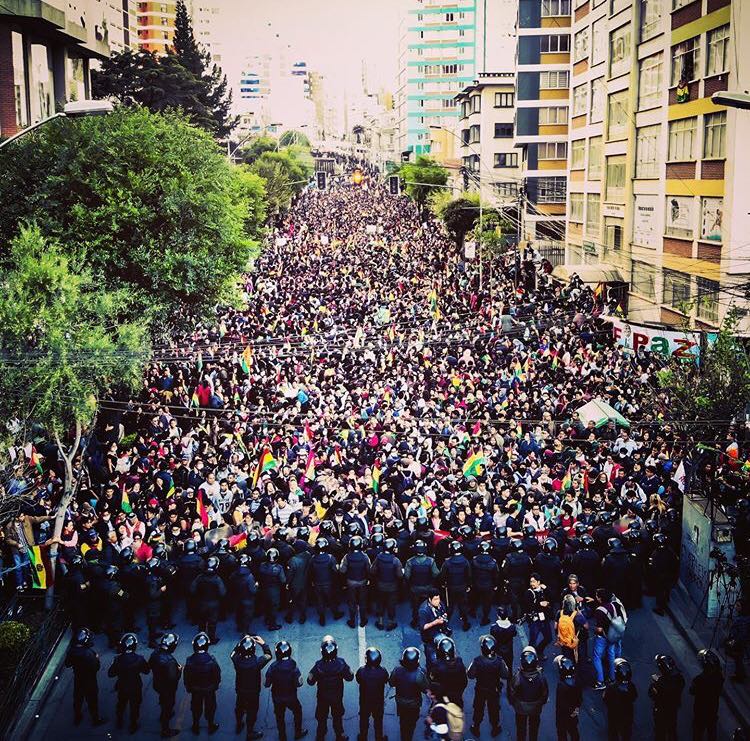Replacing authoritarian leaders by challenging the fairness of the election. The example of Bolivia

Currently a peculiar liberal democratic paradigm is being cultivated in Europe and the United States, that authoritarian leaders can remain in power for a long time only by falsifying election results. Therefore, the scenario of political change has now been developed in many places. When an authoritarian leader who has been in office for a long time is re-elected, those who want change (and there are always many of them in authoritarian regimes, especially if the leader has been in power for decades) declare that the election results are falsified and demand a change of power, new elections, etc. This is exactly the scenario that was implemented in the Latin American country Bolivia in 2019.
In 2005, the socialist Evo Morales was elected President of Bolivia. Bolivia, under Morales, established friendly relations with Cuba and Venezuela. It opposed the US policy implemented in Latin America. At the same time, Bolivia has undergone restructuring, increasing state influence in many sectors. In order to retain his power, legislation in Bolivia was changed to allow Evo Morales to remain in power without time limitation.
On October 20, 2019, Bolivia held regular presidential elections. The official results of the election were published on October 21, showing that Evo Morales had won 47.07% of the vote, while his closest rival, the right-wing opposition candidate, had only 36.51% of the vote. According to the Bolivian constitution, in order to be elected in the first round, the president must obtain more than 50% of the vote, or he must obtain more than 40% of the vote, but then the nearest competitor must be overtaken by ten percentage points. Following the announcement of the results of the presidential election, riots broke out in Bolivia. The right-wing opposition said the election results were rigged and called for new elections. After several weeks of protests, the Bolivian president called new elections. However, after the armed forces switched to support the right-wing opposition, Evo Morales resigned and left Bolivia.
Power was taken over by the right-wing opposition, which immediately radically changed Evo Morales' foreign policy. Bolivia appointed an ambassador to the United States, severed diplomatic relations with Cuba, and so on. Evo Morales and his closest associates were accused of corruption, and so on. Domestically, instead of Evo Morales' left course, a marked turn to the right began.
It was declared that the dictatorship of the former authoritarian corrupt clique would be replaced by true democracy. Consequently, the new authority had to hold new presidential elections, as the takeover of power in Bolivia without respect for democratic procedures earned harsh criticism from the left in Latin America and elsewhere in the world. Bolivia's presidential elections were scheduled for May this year but were postponed until autumn due to the Covid-19 epidemic. In the end, new presidential elections took place in Bolivia on 8 October, which are undoubtedly free, democratic and certainly not rigged.
However, in the first round of the Bolivian presidential election on October 8, Luis Arce, a candidate from the former President Evo Morales’ party Movement for Socialism, won with 55.1% of the vote. The right-wing candidate did not get even a third of the vote.
A number of issues can be raised when assessing the events in Bolivia. It is possible that the results of the 2019 presidential election were not falsified at all, but the allegations of falsification were a tool for the right-wing opposition to gain power by bypassing democratic procedures. It is possible that at a time when many were dissatisfied with the course led by the authoritarian leader and wanted change, a significant part of the population was satisfied with it and did not want change at all. If this is the mood of the people, then fair and democratic elections will not make the newcomers win. This may apply both to Latin America, which has a very strong leftist tradition, and to Belarus, where the older generation is reluctant to support radical change. If truly fair elections take place, they will only show the proportion between the people who want change and those who do not.
In any case, even if the results of the 2019 Bolivian presidential election were modified in favor of Evo Morales, one year of right-wing rule was sufficient to get the majority of voters to support the socialists.
It is very likely that for right-wing parties to gain power in a left-wing society, they will have to give up democracy as such or manipulate or falsify the election results.
